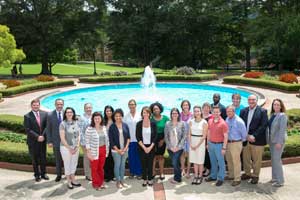
Cumberland School of Law welcomed its first cohort for the new Master of Science in Health Law and Policy (MSHLP) degree at an on-campus orientation August 21 and 22. Students had the opportunity to meet program faculty and administration, as well as spend time with fellow students. Health-care professionals from the Birmingham area also joined the group to share their expertise and answer questions.
With an interesting entering cohort of approximately 20 students including an experienced surgeon, nurses and nurse practitioners, health care administrators, lawyers, a priest and a few recent college graduates, the class will surpass the target enrollment for the new program. Although the group varies in age, background and hails from seven states, all of the students hope to increase their expertise in the increasingly complex field of health law. “I am extremely excited about the MSHLP program because I believe it will help me develop an even better understanding of the laws and policies that impact physician practices,” said Loretta Duncan, a senior medical practice consultant for State Volunteer Mutual Insurance Company in Brentwood, Tennessee. “This program will help me achieve my personal goal of obtaining a graduate degree while I continue to work full-time. It will also benefit my company by giving me the tools to provide more specialized services to our policyholders. I can’t wait to begin.” Kathryn Andreolli, an in-house counsel for a large orthopedic practice in Lindenhurst, New York, shared similar sentiments. “I love my job and anticipate getting even better at it through this program,” she said. “I hope to broaden my knowledge and understanding of compliance specific to healthcare providers and increase my understanding of healthcare delivery systems in general.”
The degree will be the first fully online program offered by the law school, as well as its first degree program for nonlawyers. With input from health law and compliance experts both on campus and in the community, Cumberland School of Law was able to develop a curriculum that could earn accreditation from the Compliance Certification Board® (CCB). Samford University earned that accreditation and is one of only eight universities nationally to be accredited by the CCB. This accreditation will enable students to sit for one of four credentialing exams offered by that organization upon graduation.
Experienced faculty from Samford’s Cumberland School of Law and College of Health Sciences, as well as compliance professionals from the community, will participate in the program. The program includes coursework in health law, regulatory affairs, public policy, insurance and health-care administration, with a particular emphasis on health-care compliance. The online program takes two years to complete, with students completing two classes per term through fall, spring and summer of their first year. The second year includes two classes in fall and in spring, and a final summer course. Two or three on-campus weekends are planned.
